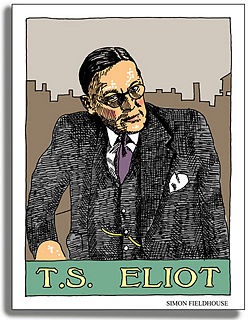Christian poetry
Christian poetry is poetry that employs Christian teachings, themes or strongly references Christianity.
Christian poems frequently reference the Bible. The Bible contains poetical passages in the Old Testament.
Contents
Book of Revelation and the parallelism of Hebrew poetry
Hans K. LaRondelle wrote in his article Understanding the book of Revelation: Three interpretative keys which has published in the journal Ministry:
| “ | As a Hebrew Christian, John adopted Israel's covenant language and style of expression. This was completely familiar to Jewish Christians acquainted with Moses, the Psalms, and the Prophets. One important literary feature is illustrative of this and has hermeneutical significance: "The parallelism of the style is too obvious to be ignored. The author repeatedly breaks forth into verse in which the parallelism of Hebrew poetry is carefully observed."[1] | ” |
T.S. Eliot's conversion to Christianity and its effect on his production of poetry
Barry Spurr wrote:
| “ | It might have been expected, after Eliot's conversion a few years later, that his recognition of the promise of salvation which Christianity proposes would have been reflected in revolutionary changes in his poetic subjects and techniques.
Instead, it is the consistency of Eliot's poetry, from 1927 onwards, with what he had been writing before that most often strikes us. Several powerful metaphors remain, such as, for example, that of the journey (which we encounter, for instance, in "Prufrock" and in the quest-motif in The Waste Land). Indeed, Eliot's first "Christian" poem is called "Journey of the Magi" (1927). What is notable about this work is the perilousness of the undertaking ("A cold coming we had of it"), underlined by the contingency of the outcome and the lack of final resolution as a single Magus meditates upon the journey at the end.[2] |
” |
See also
- Paradise Lost
- First Century Aramaic Jewish Christian Gospel and poetry
- Book of Job
- Psalms
- Song of Solomon
- Atheism and poetry
References
- ↑ Understanding the book of Revelation: Three interpretative keys by Hans K. LaRondelle, Ministry
- ↑ The impact of T.S. Eliot's Christianity on his poetry by Barry Spurr
